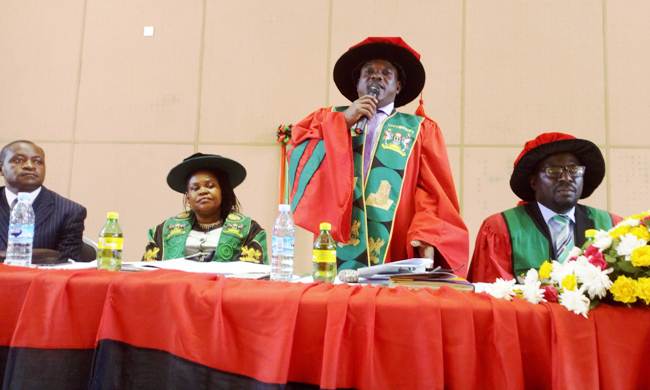The Executive Secretary of Uganda Business and Technical Examinations Board (UBTEB), Mr. Oyesigye Onesmus (CPA), has advised graduates to adopt soft skills to supplement their professional experience. According to Mr. Oyesigye skills such as truthfulness, patience, time management, trustworthiness and honesty are some of the traits a person who would like to get a job and sustain it should exhibit.
“Employers find it difficult to let go of the few trustworthy workers. They also fear to employ unmanageable workers who are liars, impatient and dishonest,” he said.
Presiding over the Award Ceremony for Diploma and Certificate Students of the Centre for Lifelong Learning, College of Education and External Studies (CEES), Makerere University on Saturday, 19th January 2019, Mr. Oyesigye advised parents to always guide and support the interests of their children when it comes to academic journeys.

“On so many occasions, parents have forced their children to undertake certain courses and the results have not been good. You want your children to fulfil your dreams. Let the children determine their academic journeys and professional paths. You duty is to guide not to make for them decisions. Let them create their own career paths” he said.
He encouraged students to make use of the Government loan scheme to advance their level of education.
The National Coordinator of the Centre for Life Long Learning Mrs. Rose Atugonza, emphasized discipline and hard work among students when she said, “Discipline is the key to success in one’s life. With discipline and hard work you are ready to succeed in this competitive world,” she advised.

The Centre for Life Long Learning was the first Centre at Makerere University in 1922; under the Centre for Continuing Education. The Centre focuses on bridging the gap between individuals who are unable to come to the University through the intra-mural programmes with the University community. It helps in making University learning relevant to the community through identifying their learning needs and designing as well as offering problem-solving programmes in a flexible and non-formal manner; and promoting partnerships and collaborations with development agencies for technology/knowledge transfer.
Addressing the graduands, the Deputy Principal CEES, Assoc. Prof. Paul Birevu Muyinda tipped the new Diploma and Certificate holders on how to prepare for the job market in the competitive world.
“Be flexible in life and to always adjust when the need arises. Be productive and accountable. And if you remember to observe the traits of a good leader, the world will be an easy place for you to enjoy,” he counseled.

Representing the Dean, School of Distance and Life Long Learning-Dr. Alex Okot, Dr. Ronald Mukuye congratulated the graduands upon the great achievement in their lives. He advised them to enrol for further studies and to widen their networks.
Article by Rachael Kanyi, Volunteer, Mak Public Relations Office


 General2 weeks ago
General2 weeks ago
 Natural Sciences2 weeks ago
Natural Sciences2 weeks ago
 Agriculture & Environment1 week ago
Agriculture & Environment1 week ago
 General6 days ago
General6 days ago
 Health2 weeks ago
Health2 weeks ago





